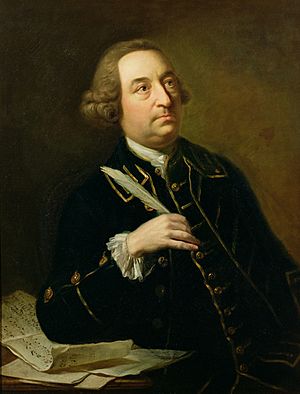John Christopher Smith facts for kids

John Christopher Smith (born Johann Christoph Schmidt) was an English composer. He was born in 1712 in Ansbach, Germany, and passed away on October 3, 1795, in Bath, England. John Christopher Smith followed in his father's footsteps, becoming the secretary and musical helper for the famous composer George Frideric Handel.
Contents
A Life in Music: John Christopher Smith's Journey
John Christopher Smith Jr. was the son of Johann Christoph Schmidt (also known as John Christopher Smith Sr.). His father was Handel's first music copyist in London. Handel knew Smith Sr. from Halle, Germany, and asked him to come to London in 1716. The family moved to London around 1720.
Early Musical Training
Young John Christopher Smith had some music lessons from Handel himself and from Johann Christoph Pepusch. However, he mostly studied with a teacher named Thomas Roseingrave. Smith later became Handel's secretary and musical assistant. He was also Handel's amanuensis, which means he wrote down music and notes for Handel. This was especially important when Handel became blind in his later years and could no longer write or conduct himself. Handel's last time conducting his oratorios was in 1752.
Working with Handel
Even though Handel and Smith Sr. had some disagreements in the 1750s, Handel remained good friends with John Christopher Smith Jr. From 1753 until Handel's death in 1759, Smith conducted Handel's oratorios. An oratorio is a large musical work for voices and orchestra, usually based on a religious story.
When Handel passed away in 1759, he left his keyboard instruments and all his music manuscripts to Smith. This was a great honor and showed how much Handel trusted Smith.
Making Music for Barrel Organs
People in those days were interested in new ways to play music, even using mechanical devices like clocks. After Handel's death, Smith worked with a person named John Langshaw. They worked on a project to arrange Handel's music for a barrel organ. A barrel organ is a mechanical organ that plays music when a pinned barrel is turned.
Family Life and Retirement
In 1760, John Christopher Smith married Martha Coxe. Through this marriage, he became the stepfather to William Coxe, who later became a historian.
After his oratorio Paradise Lost became very popular in 1760, Smith became the artistic director of the Covent Garden Royal Theatre. This was a very important job. However, he had to leave this position in 1772 due to health problems. In 1774, the King gave him a yearly payment, and Smith retired to Bath.
When his wife died in 1785, he moved to Carlisle Street in London's Soho area. He passed away there in 1795. Today, a blue plaque marks the spot where he lived, honoring his memory.
John Christopher Smith's Musical Creations
Smith wrote many different types of music, including operas, oratorios, and pieces for the harpsichord.
Operas by Smith
Smith's first opera was an Italian-style work called Teraminta. It was first performed on November 20, 1732, in London. Soon after, his opera Ulysses was performed on April 17, 1733. However, Ulysses was not very successful. After this, Smith decided he would not perform any more operas.
But in 1740, Handel encouraged him to try again. Smith then started his own series of concerts. Over nine years, he had six Italian operas performed:
- Rosalinda (1740)
- Issipile (1743)
- Il Ciro riconosciuto (1744)
- Dario (1746) - now lost
- Demofoonte (1747) - now lost
- Artaserse (1749) - now lost
Later, he wrote three operas with David Garrick that were based on plays by Shakespeare:
- The Fairies (1755), based on A Midsummer Night's Dream
- The Tempest (1756)
He also wrote a successful short play with music called The Enchanter (1760). His last opera, Medea, was written in 1763.
Oratorios by Smith
Smith also composed several oratorios. His oratorio David's Lamentation over Saul and Jonathan was performed in 1740. That same year, he wrote The Seasons.
Between 1759 and 1768, Smith was the organist at the Foundling Hospital. He also directed the yearly performances of Handel's famous oratorio, Messiah, there.
Paradise Lost, first performed in 1760, was his most successful oratorio. He later created four more oratorios that used a lot of Handel's music:
- Rebecca (1761)
- Nabal (1764)
- Tobit (1764)
- Gideon (1769)
Some other oratorios he wrote include Judith, Jehosaphat, and Redemption. Redemption was found in a library in Paris in 1998.
Other Musical Works
John Christopher Smith also wrote five collections of music for the harpsichord, a keyboard instrument similar to a piano:
- Suites de pièces pour le clavecin, Op. 1 (1732)
- Suites de pièces pour le clavecin, Op. 2 (1735)
- Six Suits of Lessons for the Harpsicord, Op. 3 (1755)
- A Collection of Lessons for the Harpsicord, Op. 4 (1757)
- XII Sonatas for the Harpsichord, Op. 5 (1765)
He also wrote a book of hymns in 1765. In 1772, he composed a special funeral service for the dowager Princess of Wales. She had been his harpsichord student. Smith also wrote two cantatas, which are vocal pieces with instrumental accompaniment: Winter, or Daphne and Thamesi, Isi, e Proteo.
 | Mary Eliza Mahoney |
 | Susie King Taylor |
 | Ida Gray |
 | Eliza Ann Grier |

